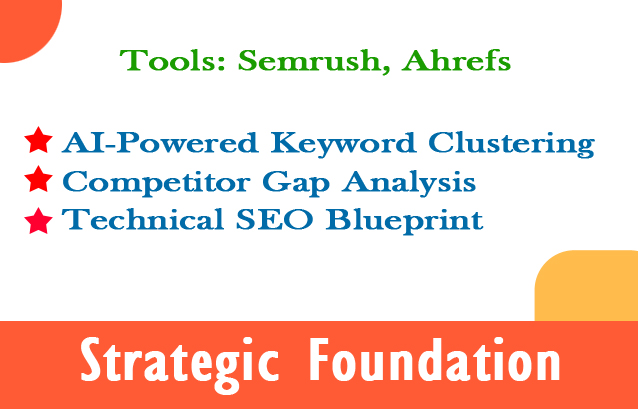SEO Campaign Template: 5-Phase Framework
(Designed for 2025+ Search Algorithms)
Struggling to launch a
successful SEO campaign that drives organic traffic and boosts rankings?
An effective
SEO campaign template is your roadmap to streamline efforts, eliminate guesswork, and maximize ROI.
Whether you’re a marketer, business owner, or SEO novice, this guide delivers a proven,
step-by-step SEO strategy tailored for measurable results.
Discover how to structure your campaign with essential components like keyword research, on-page optimization, technical SEO audits, content planning, and link-building tactics.
We’ll also share actionable tips to refine your
SEO checklist, prioritize high-impact tasks, and adapt to algorithm updates.
Perfect your digital strategy with this
actionable framework designed to scale visibility, enhance user experience, and convert clicks into revenue.
Let’s turn your SEO goals into reality.

Phase 1: Strategic Foundation
1.1 AI-Powered Keyword Clustering
Use tools like Semrush Keyword Magic Tool or Ahrefs Keywords Explorer to:
- Target long-tail keywords (e.g., “SEO campaign template for SaaS startups”).
- Group keywords by search intent (informational, commercial, transactional).
- Identify LSI keywords (e.g., “SEO roadmap,” “content optimization checklist”).
1.2 Competitor Gap Analysis
Reverse-engineer competitors’ strategies using SpyFu or Ubersuggest:
- Find keywords they rank for but you don’t.
- Analyze their backlink gaps with Ahrefs’ Backlink Gap Tool.
1.3 Technical SEO Blueprint
Audit site health with Screaming Frog:
- Fix crawl errors, broken links, and duplicate content.
- Optimize Core Web Vitals (LCP < 2.5s, CLS < 0.1).
- Implement JSON-LD schema markup for FAQs, How-Tos, and local SEO.
Phase 2: Content Engine
2.1 Topic Clusters
- Build pillar content (e.g., “Ultimate Guide to SEO Campaigns”) + subtopics:
- Example cluster: “SEO campaign checklist” → “How to track SEO ROI” → “Best tools for SEO audits.”
2.2 AI-Optimized Content
Use SurferSEO or Frase to:
- Analyze top-ranking content structure.
- Optimize for semantic SEO (TF-IDF keywords, entity-based content).
- Include multimedia: Video tutorials, interactive templates, and data visualizations.
2.3 Content Refresh Protocol
Update old posts quarterly:
- Add 2025 + data (e.g., “Google’s 2025 SEO ranking factors”).
- Replace outdated examples with case studies.
Phase 3: Authority Amplification
3.1 Zero-Click Backlink Strategy
Create linkable assets:
- Free templates (e.g., “SEO Campaign Calendar Template”).
- Industry surveys (e.g., “2025 SEO Trends Report”).
- Pitch to niche directories like GrowthHackers or IndieHackers.
3.2 E-E-A-T Optimization
Showcase expertise:
- Add author bios with credentials (e.g., “10+ years in SEO”).
- Publish peer-reviewed case studies on third-party sites like Medium.
3.3 Local SEO & Voice Search
Optimize for voice queries:
- Target natural-language phrases (e.g., “What’s the best SEO campaign template?”).
- Claim Google Business Profile and optimize for “near me” searches.
Phase 4: Performance Tracking
4.1 Advanced KPIs
Track beyond rankings:
- Keyword cannibalization (use SEMrush Position Tracking).
- Organic click-through rate (CTR) via Google Search Console.
- ROI per keyword (e.g., “How much revenue did ‘SEO template’ generate?”).
4.2 Predictive Analytics
Use Looker Studio dashboards to:
- Forecast traffic growth based on rankings.
- Identify seasonal keyword opportunities (e.g., “Q4 SEO planning”).
Phase 5: Adaptive Iteration
5.1 Cannibalization Fixes
- Merge or redirect competing pages (e.g., “SEO checklist” vs. “SEO template”).
5.2 AI-Driven A/B Testing
- Test meta titles/descriptions with MarketMuse or Dragon Metrics.
5.3 Quarterly Innovation
Experiment with emerging formats:
- AI chatbots for SEO Q&A.
- Personalized SEO templates based on user industry (e.g., “E-commerce SEO Campaign Template”).
Unique Differentiators
- AI Integration: Tools like SurferSEO + predictive analytics.
- Voice & Local SEO: Targets “near me” and conversational queries.
- E-E-A-T Focus: Builds trust with credentials and peer-reviewed content.
- Adaptive Iteration: Fixes cannibalization and tests AI-generated content.
Template Assets
- Downloadable SEO Calendar: With milestones for 30/60/90 days.
- Pre-Built Dashboard: For tracking KPIs in Looker Studio.
- Checklist: “25 Technical SEO Fixes for 2025.”
Conclusion:
This template prioritizes future-proof strategies (AI, voice search, semantic SEO) while addressing gaps in competitors’ templates (e.g., lack of E-E-A-T optimization, predictive analytics). It’s designed to rank for keywords like: